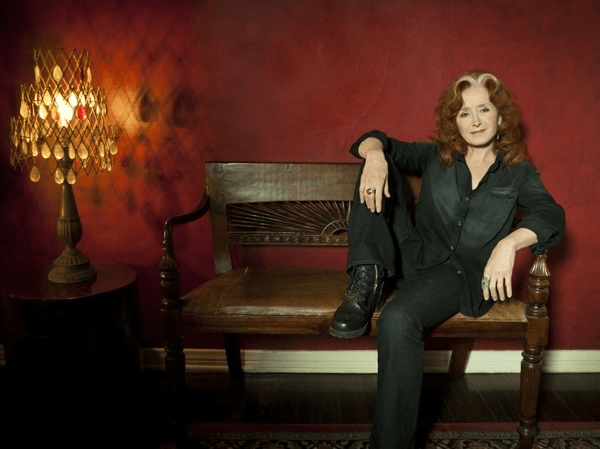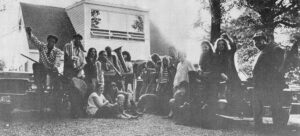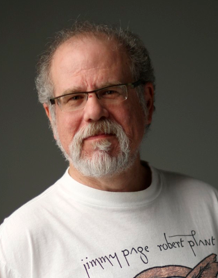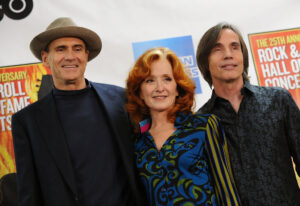
Bonnie Raitt has long considered Minnesota her second home.
She recorded her first album here in 1971. Her brother Steve lived here for three decades. She’s skied on countless Minnesota lakes. And she’s performed in various venues from the University of Minnesota’s Whole Coffeehouse to the State Fair grandstand, where she’ll make her eighth appearance on Monday.
What’s the most Minnesota thing about Bonnie Raitt?
“My appreciation of funkiness,” said the California-born and -based blues/rock/pop veteran.
She then recited a list of names — a who’s who of the West Bank and Minneapolis scene — including Koerner, Ray & Glover, Willie Murphy, John Beach and even Bob Dylan, and later favorites the T.C. Jammers and Mambo’s Combo.
“When I dove into [the Minneapolis scene] — the multicultural aspect of so many integrated bands, great rock and R&B and blues and original songwriting — you can’t imagine what a refreshing impression I got of how original everybody was,” Raitt continued. “They were funky in all the ways of the word. Not caring about fashion, not caring about making money, not swept up in the things that the coasts are consumed with. That multiculturalism stayed with me. I can’t put into words how great that scene was.”
Speaking of funk, Prince reached out to Raitt in 1986 after her 15-year relationship with Warner Bros. Records went sour.

“He said, ‘It was unfortunate you were treated that way [by Warner Bros., his label as well] and would you like to come and do some songs together at Paisley Park. I really appreciate women artists and I’ve always admired you,’ ” recalled Raitt. “I was looking at several offers and I didn’t know if it would be a good fit for me and I didn’t want to necessarily make a commercial dance hit or have that kind of profile. I said, ‘If we could meet in the middle and just so you know that I’m not coming over to be produced by you and be a pawn in your playground. If it can be a real collaboration, then I’d like to do it.’ ”
They arranged a date but Raitt had a skiing accident and her thumb was in a cast. They rescheduled, but meanwhile Prince had already written a couple of songs and recorded the instrumental tracks.
“I appreciated the enthusiasm, but they were not in my key,” Raitt recalled. “The topics were not things I was comfortable singing. It was something like ‘You can mess me around all over town/ But we’re still cool/ I like being your fool.’ That’s not something I’d sing. He was guessing about the lyrics. I loved the tracks but because I wasn’t there I said, ‘We’re going to have to reconvene.’ While I was there, I did a little work on those tracks. They were four or five keys lower than what I sing. It was a lot of fun. He couldn’t have been nicer.”
They talked about their common tastes in music — the Staple Singers, Sly Stone, Earth Wind & Fire and various Minnesota acts.
“We stayed in touch,” Raitt said. In fact, they had a rescheduled date but then Prince extended his European tour.
“He never called me, and I put my guys out of work for six weeks,” Raitt remembered. “A phone call would have been nice.”
Her own label
After rebounding on Capitol Records in 1989 and scoring eight Grammys in six years, Raitt started her own label, Redwing, four years ago. Her first Redwing album, “Slipstream,” won a Grammy for best Americana album and became one of the bestselling indie discs of 2012. This year, she delivered her second Redwing record, “Dig in Deep.”
The album features five Raitt originals, the most songs she’s penned for an album since 1998’s “Fundamental.”
“I was going through 10 years of family illness. There was no chance for inspiration,” said Raitt, 66, referring to two albums that, combined, featured only one of her own compositions. “With the relief of not having to deal with a crisis in my personal life, I had time to focus on writing.”
She thought about grooves she wanted for her concert repertoire. She also had other ideas.
“I wanted to play piano in this gospel Leon Russell kind of shuffle,” she said with enthusiasm. “I wanted to write a political song because everyone’s so pissed off because money has hijacked the political process. I carefully crafted something I thought would appeal to a lot of people. It gets it out there with a Stones feel.”
Political commentary
Although she avoids talking politics onstage in this election year, the longtime activist doesn’t shy away from commentary on her album. “The Comin’ Round Is Going Through” is her indictment of money fueling elections. And she’s singing the new tune on tour.
“People stand up and cheer. I haven’t gotten any boos,” Raitt observed. “I’m very careful about not preaching about my own politics from the stage. I know there’s people who like my music that don’t agree with my politics. It’s been going over great.”
Another “Dig in Deep” number that has become a concert staple is “Need You Tonight,” the INXS hit from 1987. It’s one of the sexiest booty calls Raitt has ever assayed.
“I love rearranging older songs that I love,” she explained. “I love INXS. Ever since that one came out, I wanted to cut it. I’ve been waiting for the right album. I had an idea for how to slow it down and where to put the slide [guitar]. I just wanted to have that pause. It makes me feel exactly what it sounds like.”
One new song she hasn’t been performing in concert is “The Ones We Couldn’t Be,” which closes “Dig in Deep.” It’s one of those deeply emotional Raitt ballads with many layers of meaning.
“I want to go deep when I sing songs, especially ballads,” Raitt said. “It took a long time after the passing of my family and a love relationship.
“The first verse is about my romantic life, the second verse is about my family and the last verse is about forgiveness. How I forgive myself and how I’m handling it. I’m sorry for the one I couldn’t be and I’m sorry for the one that couldn’t be for me. [The song] didn’t come to me until several years after processing loss.”
Raitt has yet to perform “The Ones” in concert.
“Where do you put it?” she asked. “After ‘I Can’t Make You Love Me’? People would be slitting their wrists.”
Three blockbusters
Deep emotions have been a hallmark of Raitt’s since her self-titled debut album, which was recorded in Minneapolis folk-bluesman Dave Ray’s studio on an island in Lake Minnetonka with Willie Murphy as producer.
While Raitt’s soulful vocals and guitar chops (especially on slide guitar) landed her in the Rock and Roll Hall of Fame in 2000, she’s as well known for ballads (“I Can’t Make You Love Me,” “Angel From Montgomery”) as she is for rockers (“Thing Called Love,” “Something to Talk About”).
In her midcareer, the daughter of Broadway star John Raitt scored three blockbuster albums — 1989’s chart-topping, 5-million-selling, Grammy-winning “Nick of Time,” 1991’s 7-million-selling “Luck of the Draw” and 1994’s No. 1 “Longing in Their Hearts.”
A generous friend to many musicians, the ever-versatile Raitt has appeared on tribute albums to Stevie Ray Vaughan, Fats Domino, Pete Seeger, Jackson Browne and Lowell George and performed salutes on the Grammy Awards to Etta James and B.B. King. She’s also contributed to albums by Ruth Brown, Charles Brown, Keb Mo and Ladysmith Black Mambazo, among others.
Dealing with sadness
Raitt is no stranger to sadness. It’s not just the unrequited tearjerkers she’s recorded but she’s experienced lots of death, particularly when her parents passed in 2004 and 2005 and her brother Steve, a longtime Twin Cities sound engineer/producer, succumbed to brain cancer in 2009.
In a year in which such musical heroes as David Bowie, Merle Haggard, the Eagles’ Glenn Frey and Prince have died, Raitt says she figured out how to deal with death a long, long time ago. That’s because she spent the early part of her career in the 1970s working with such veteran blues figures as Mississippi Fred McDowell and Sippie Wallace, who died when Raitt was young.
“If I hold the grief in, you can have problems with lungs and bronchial,” she pointed out. “There are certain areas of the body where if you don’t express anger and jealousy and grief and sadness, it can actually cause illness. It’s good to process that stuff and get it out. I don’t turn away from it.”
She likes to stay in touch with what she calls the “tribal campfire.”
“We can suffer with them and, in terms of grief, it really helps to write e-mails and call people and share what they meant to us. The coverage of Prince was incredibly beautiful and it helped us all.”
Raitt has made a habit of telling people she loves them, especially older pals like Mavis Staples, 77, and Tony Bennett, 90.
“Tony Bennett, what an incredible blessing. Such messages of positivity. Tony is a longtime meditator. They used to sit me and my dad next to him at awards shows. He’s got a fundamental sense of OK and calm and perspective, and he experiences life to the fullest and it doesn’t throw him off the rails. He’s so centered. It’s a big lesson for me.”















 Visitors Today : 110
Visitors Today : 110 Now Online : 2
Now Online : 2















































































































